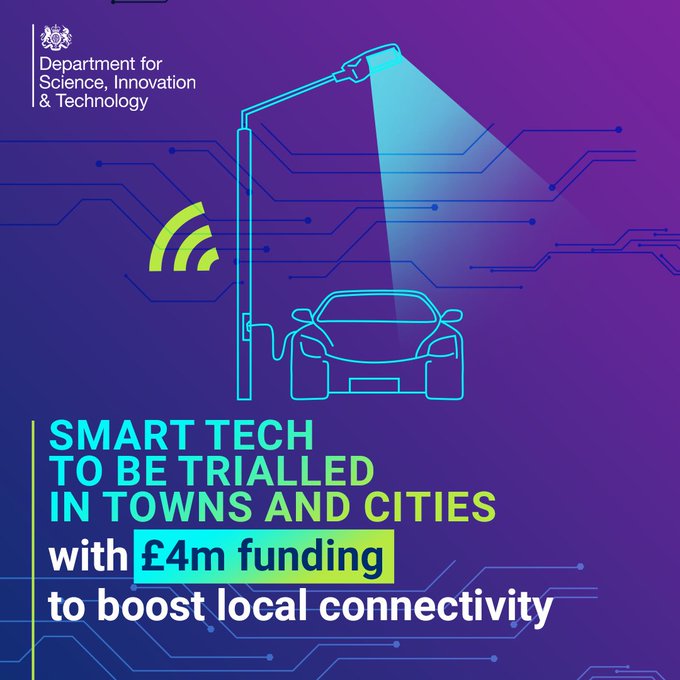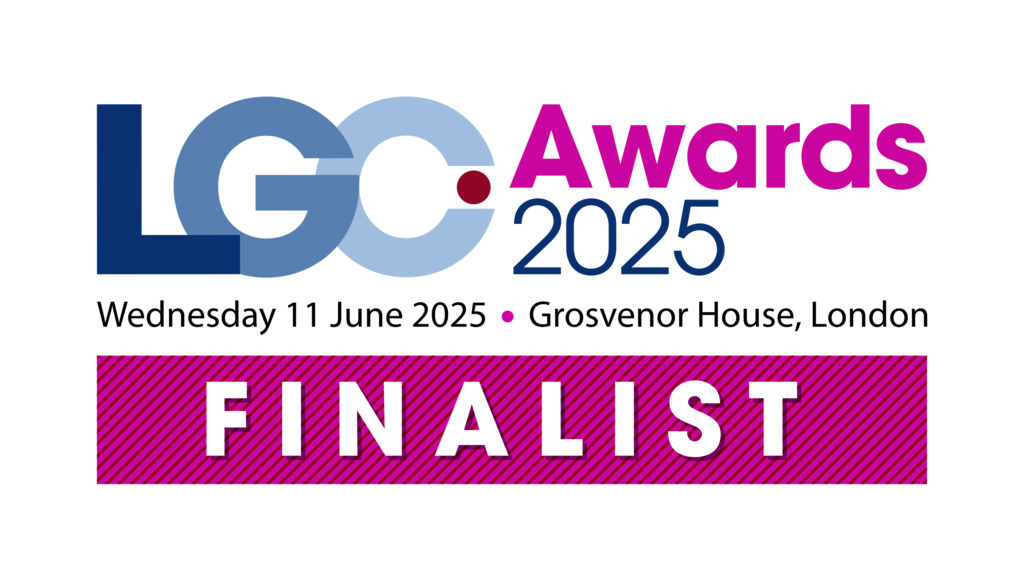Connecting Cambridgeshire secures £220K funding from Smart Infrastructure Pilots Programme competition

Smart tech to be trialled in towns and cities with £4 million funding to boost local connectivity
20 September 2023 this article was first published on gov.uk
- Six areas across the UK awarded funding to test smart street lamps that can house EV charging hubs and boost wireless coverage including 5G
- areas to match government funding to trial multi-purpose tech that can help local authorities unlock new economic, environmental and social benefits
- funding delivered through Smart Infrastructure Pilots Programme (SIPP) to level-up digital connectivity
Smart street lamps that can charge electric vehicles and boost wireless coverage will be rolled out in towns and cities across the UK, as part of a £1.3 million pilot to test next-generation digital technologies.
With the rising demand for wireless services, companies are increasingly exploring opportunities to install infrastructure on lamp posts, traffic lights, CCTV columns, benches, bins and bus stops. That is why six areas from across the UK will receive funding to trial new multi-purpose street columns which will house equipment to support the rollout of advanced wireless networks like 5G or free public WiFi, boosting connectivity for people out and about in town and city centres.
The successful pilots will match government funding for this programme, receiving a total investment of over £4 million to help boost local connectivity. The government will provide £1.3 million, while the local authorities will invest a further £2.7 million – helping to deliver better services in communities.
These pilots can also be adapted to carry out a range of functions – from charging EVs to monitoring air quality, and displaying public information to saving energy with street lighting – that will enable councils and combined authorities to unlock new opportunities and improve public services.
The six authorities which will receive government funding through the Smart Infrastructure Pilots Programme (SIPP) are:
- Cambridgeshire County Council (£220,000) – find out more about our project at the bottom of this page
- Tees Valley Combined Authority (£202,500)
- Royal Borough of Kingston upon Thames (£245,700)
- Westminster City Council (£165,000)
- Oxfordshire County Council (£250,000)
- North Ayrshire Council (£242,765)
By trialling different uses across these areas, the aim is to show how state-of-the-art wireless technology can become an integral part of UK infrastructure, connecting public services and businesses in new ways to realise the full benefits of 5G and advanced connectivity.
Minister for Data and Digital Infrastructure Sir John Whittingdale said “The way we stay in touch, access information and do business is underpinned by digital connectivity – and a world-class wireless infrastructure will be the foundation for the jobs, skills, and services of the future.
“We want to ensure that towns and cities across the UK are right at the forefront of this connectivity revolution, ready to seize the opportunities it will bring for local communities, which is exactly what these pilots are about.
“They will help demonstrate how advanced wireless technology can enable areas to innovate and deliver better public services, from rolling out electric vehicle chargers to boosting business growth and helping keep our streets safe.”
Julian David, CEO, techUK said: “Today’s announcement is a welcome step from the UK government in putting wireless connectivity at the heart of local infrastructure deployment. We must empower more local authorities so that they can foster the greater use of advanced connectivity in their areas, helping unlock growth and innovation across the whole of the UK.
“As techUK set out in our recent Tech Plan, we must give consumers the confidence to switch to electric vehicles to help overcome ‘range anxiety’, one of the major factors preventing greater uptake of EVs.
“We hope these pilots can help other local areas realise the benefits that smart infrastructure promises.”
The SIPP is designed to support the government’s Wireless Infrastructure Strategy, which sets out how the UK will put wireless connectivity at the heart of new and existing infrastructure, while driving private investment, boosting innovation, and unlocking new opportunities for economic growth.
The pilot programmes will begin from October 2023 and will run until 31 March 2025.
Cambridgeshire SIPP Project
Cambridgeshire County Council’s digital connectivity programme Connecting Cambridgeshire is excited to be leading this project to design and deploy Smart Poles in the region. Our goal is to support digital progress in our area, and we’re focused on making it easier and more cost-effective to set up telecoms equipment to enhance connectivity.
Ensuring that telecoms equipment can be installed and deployed in a more commercially viable way to boost connectivity is a key priority within Cambridgeshire’s Digital Strategy and supports the regions digital ambitions. Future-proofing street furniture to meet anticipated needs will play a key role in reducing costs and timeframes to deploy telecoms equipment and speed up investment. Installing Smart Poles will improve connectivity by providing local authorities with a platform to deploy their smart city infrastructure.
Our project team consists of highly qualified partners in local government and expert neutral host, smart technology and EV charging providers. Together the team will collaboratively design, deliver and test a range of Smart Poles capable of hosting a variety of equipment.
The SIPP programme is a separate, but complimentary initiative to the 5G Innovation Regions that was announced in April, forming part of DSIT’s wider programme to drive 5G adoption across the UK.
This initiative will operate at scale and be empowered to unlock opportunities tailored to their specific needs and strengths, to generate value and growth at the local level – working with local industry and public services through the adoption of 5G and other advanced networking technologies.
This is made possible through funding from the Shared Outcomes Fund which encourages collaboration between different government departments to achieve common goals. The Smart Infrastructure Pilots Programme is a joint effort between the Department for Science, Innovation and Technology (DSIT) and the Department for Transport (DfT).
The pilots will match government funding for this programme, a total investment of over £4 million to help boost local connectivity. The government will provide £1.3 million, while the local authorities will invest a further £2.7 million.
These pilot projects are specifically testing the application of the British Standards Institute Publicly Available Standard 191 (PAS 191) for designing and acquiring new smart infrastructure by local authorities.
Related Posts

Digital Switchover Awareness Campaign and Events for SMEs in Cambridgeshire and Peterborough

CORE’s 5G network trial and Augmented Reality Experience showcases the future of live events

